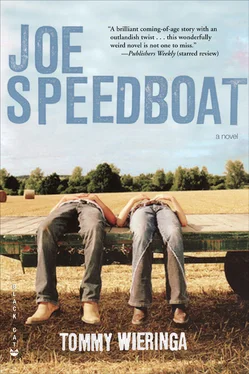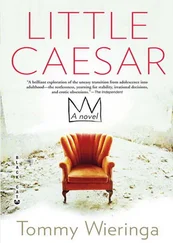Joe and Engel chose maths, chemistry and physics, which to me is like decoding a message from another planet. The only one who chose two full years of economics was Christof — in order, I believe, to learn the tenets of the entrepreneurship in store for him by birth.
All three of them pass their exams too, but Joe forbids his mother to hang out the book bag and flag. Even Quincy Hansen passes at last, albeit only after resits in Dutch and English.
And so you’ve finished school, and then this happens: ‘It’s a solution,’ Pa says, ‘a solution.’
‘We’ve talked about it a lot,’ says Ma. ‘If it doesn’t work out, we’ll think of something else.’
‘Let him try it first. There’s no harm in having to do something. You think we used to be able to do whatever we liked? Working hard every day, and you didn’t ask yourself whether you liked it: you did as you were told.’
‘Frankie, you don’t have to do anything. It’s a start.’
‘A solution is what it is! Just the thing for him. The best for everyone.’
‘But don’t you go thinking. .’
‘He knows that already.’
‘That we want to make money off it, all we want is for you to be able to stand on your own two feet. When we’re not around anymore.’
‘Is he asleep?’
‘From all that studying, sure, the boy’s worn out.’
‘He never misses a night at Waanders’ though. If he can do that, he can work too. I’m telling you, it’s a solution.’
Pa removed the plastic tarp from the pile in the garden and stood there looking at it for a while. It resembled nothing so much as a tangled mountain of pickup sticks, and I saw doubt creep into his movements. He pulled on a few loose ends and leaned a couple of parts up against my house. He avoided looking inside, he knew I was peering at him from the shadows. One hour later he had the pile sorted out: bars with bars and grids with grids. These he used to build a scaffolding against the side of the house. Left over now was a washing machine and what I knew by then was a press for making briquettes. That machine was to be the start of my career as a briquette presser. Paper briquettes, for the fireplace.
Here’s how Pa figured it: I would go door to door collecting old newspapers, and because I was a charitable cause in and of myself, people would be pleased to help out and we would have loads of paper from which to press briquettes.
The garden had now become a workshop. The paper was rinsed and pulverized in the washing machine, after which I scooped it into the press. On the side of the press was a handle I used to press the metal lid down onto the paper pulp, squeezing the water out of it. Then I laid the moist briquettes on the scaffolding against the wall. Pa would take the dried lumps to the wrecking yard, where he would sell them to customers in wintertime, or use them to heat the canteen, don’t ask me. ‘I tell you, it’s a solution. .’
Summer was in full swing, the exams seemed far behind me now, and on some days I actually felt — how shall I put it? — useful. I pulled on the press plate so hard that my hand hurt, from the bottom of the grillwork trickled a greyish sludge, water mixed with pulp and printer’s ink that had been used to report the birth of a polar bear or sixteen people killed in Tel Aviv. Headlines flashed by each time I loaded the machine, sometimes I found myself immersed in newspapers that were a year old. They weren’t very different from today’s paper, in fact; news articles were as hard to tell apart as Chinamen.
As in a sort of time machine I rocketed back and forth between an armed insurrection in April and the fall of the president in October, and looked through the window of the washing machine at how the world’s events sloshed around a few times before decaying into gray porridge. Load, fill, press, dry — mechanical and efficient. On a good day I could press about forty to fifty briquettes. Load, fill, press, dry. It was simple, and it made me happy. In some strange way I felt a connection to Papa Africa — as Joe, Christof and Engel now called him — working on his boat at the old shipyard.
When I had some strength left in my arm at the end of the day, I would ride out to see him. I liked the work around a boat, and shivered whenever he planed the wood away into a tight curl. He worked himself into a lather, standing amid a sea of light yellow wood curls that smelled heavenly. A long telephone pole that would be the mast lay on a set of sawhorses and was planed to fit. Whenever Papa Africa straightened up from his work, the pain in his back made him moan and he would rest his hands on his hips as he stretched.
He walked around his boat, surveying it critically.
‘This is what I use to make my ship,’ he said, holding up his ten fingers.
Then he pointed to his head.
‘And this is for the mistakes.’
I also liked the pounding of the chisels, which sounded from a distance as though someone were beating out music on a hollow tree.
Papa Africa began building the hull with overlapping planks, working from the keel up and hammering the wooden skin into place against the timbers. When he was finished, a real boat was there, not quite finished but also not too far from completion. The curls went flying from the yardarm.
Christof, who knew a bit about boats, said that a felucca like this one used an ‘Arab lateen rig’. I’d never gotten used to his know-it-all tone. He displayed his incidental knowledge with so much aplomb that sometimes I went home and looked it up afterwards. I was never able to catch him out.
Christof would be going to law school in Utrecht. I wouldn’t miss him. But yet, when I stopped to think about it, he was as much a part of my life as Joe or Engel. I’d had a few years to watch him closely and would have been surprised to find anything that had escaped me. I knew his tic, a contraction of the muscles around the right eye that pulled the corner of his mouth up with it. It was only slight, and it went very quickly, as though he were winking at invisible things, and I wondered whether he knew that his tic only appeared when Joe was around. Otherwise I knew that he countenanced absolutely no onions on his fries-with-the-works, and that at the age of sixteen he’d had a wet dream that featured his mother with three breasts.
Even if I didn’t like him very much, maybe you could still call it a kind of friendship when you know someone that well, like a part of yourself that you’d rather not face.
My working days began on foot. The machines and scaffolding offered enough places for me to grab hold and move around. By seven I was already up and about, early enough to hear the roosters crowing at the farms out in the polder. The first hour was too serene to ruin with washing-machine noise, I spent it reading old news and smoking cigarettes others had rolled for me. Around eight I began operations. The briquettes, gray and fragile when I took them from the press, dried within about a week into firm, light-brown loaves. After noon my legs would start hurting; then I would plop down in the cart and work like that for a few more hours in the afternoon sun.
I felt healthy and strong, I had my first real wages in my pocket, and sometimes I would sit with Joe down at the ferry landing and drink the beer I’d brought along in the saddlebag on my cart. He, Christof and Engel were still around, and if you stopped thinking about it you could imagine that things would always stay this way, that we would always form a kind of community and that I could occasionally sit at the quayside with Joe while he flicked bottle caps into the water and Papa Africa stretched his back and moaned.
P.J. had already left; she had enrolled in the literature program in Amsterdam and found a room there. Someone told me that Joop Koeksnijder had gone to visit her once, and that she had treated him like a stranger.
Читать дальше












